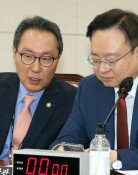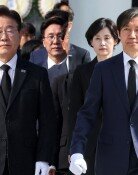Deregulation should not be viewed from labor activism of 1970s
Deregulation should not be viewed from labor activism of 1970s
Posted April. 08, 2014 03:09,
Rep. Jeon Sun-ok of the New Politics Democratic Coalition said Monday at the National Assembly, "Deregulation is a policy that plunders generations as it privatizes public profits of medical, financial and education sectors and makes future generation sacrifice." She added that if the previous Lee Myung-bak administration was business friendly, the incumbent Park Geun-hye administration is a "business following" government. Jeon is a sister of Jeon Tae-il, a workers` rights activist who committed suicide by burning himself to death in 1970 under the rule of late former President Park Chung-hee. The idea that deregulation steals generation reflects a stuck-up in the labor movement in the 1970s.
Rep. Jeon said the Federation of Korean Industries, an association that speaks for large businesses, is behind the government`s creation of a dictatorial idea. Rep. Kim Je-nam of the Justice Party said, "The key to President Park`s strong push for deregulation is resolving complaints of large companies." Nevertheless, viewing deregulation as being generous to large companies is wrong. Business-friendly environment will lead to more job creation by easing youth unemployment.
At a time when growth is stalling, regulation should be eased to reinvigorate companies` investment so that they can rebound, which will further revive the economy. Being pondered for a long time, service deregulation has been an issue. However, some parliament members consider regulation reform as giving favor to large companies. Deregulation will benefit not only large companies but also small ones.
The International Monetary Fund, in its latest report, said that Korea`s potential economic growth rate will fall to 2 percent by 2025, if the country fails regulation reform in the labor market and service sector. Potential growth rate fell to 3.25-3.5 percent in 2011-2012, far lagging behind expert`s estimates of the upper 3 percent. In France, when the leading Social party lost in the recent local elections, President Francois Hollande nominated business-friendly Interior Minister Manuel Valls as prime minister, as he believed the party`s failure came from the inability to create more jobs. Certain opposition lawmakers are ignoring the livelihoods of the public and are engaging in ideology fight, which reflects their inability to catch up with the changing world.
Headline News
- Israel prepares for retaliation against Iran
- Samsung reclaims top spot, surpassing Apple in smartphone market
- 77% of Koreans in 20s and 30s are 'Kangaroo Tribe' due to job crisis
- KBO referees embroiled in controversy over ABS decision concealment
- Inflation, oil price surge put double shock on global economy







